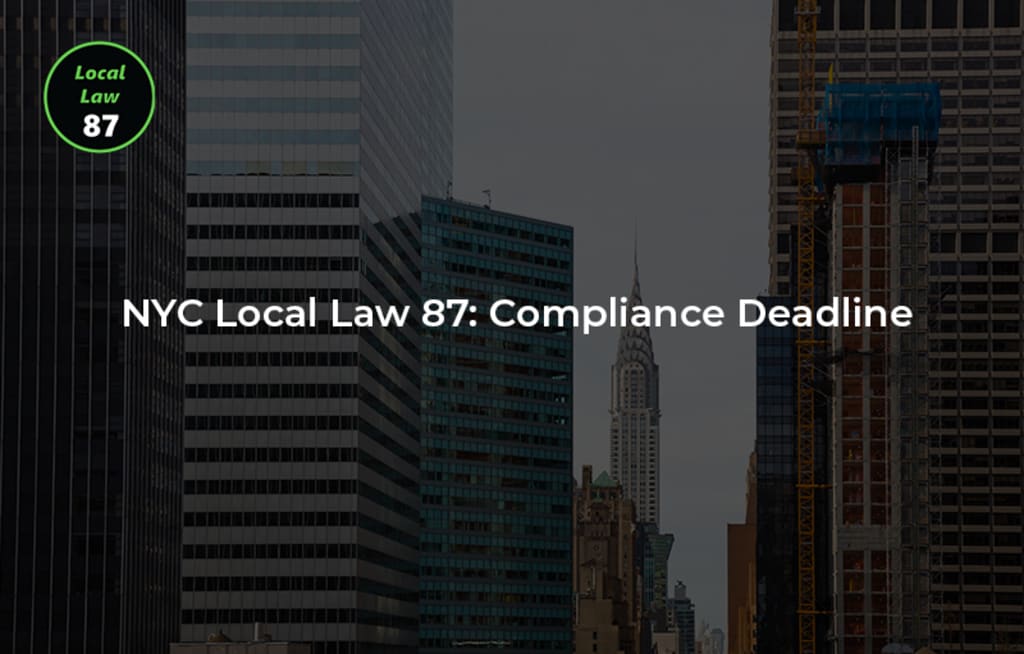NYC Local Law 87: Compliance Deadline
LL87

Local Law 87 of 2009 is a mandate in New York City that requires large buildings to undergo an energy audit and retro-commissioning study. The purpose of LL87 is to help building owners identify and implement cost-effective energy efficiency measures that can lead to reduced energy consumption, lower operating costs, and a smaller carbon footprint.
The compliance deadline for LL87 varies depending on the building's tax block number. Buildings with tax block numbers ending in "4" or "5" were required to comply with LL87 by December 31, 2013. Buildings with tax block numbers ending in "6" or "7" had to comply by December 31, 2014. Buildings with tax block numbers ending in "8" or "9" were required to comply by December 31, 2015.
Buildings that did not comply with LL87 by their respective deadlines could face penalties and fines. In addition, the building owners would miss out on the benefits of energy efficiency improvements that could save them money in the long run.
Local Law 87 – Energy Audits & Retro-Commissioning
Local Law 87 of 2009 is a New York City mandate that requires large buildings over 50,000 square feet to undergo an energy audit and retro-commissioning study. The purpose of LL87 is to identify cost-effective energy efficiency measures that can lead to reduced energy consumption, lower operating costs, and a smaller carbon footprint.
Energy audits are a comprehensive evaluation of a building's energy consumption and identify areas where improvements can be made. Retro-commissioning is the process of optimizing the performance of a building's mechanical, electrical, and plumbing systems. Retro-commissioning helps to ensure that a building's systems are functioning correctly and efficiently, identifying opportunities for optimization.
LL87 requires building owners to submit an energy efficiency report to the NYC Department of Buildings every ten years. The report must include the findings and recommendations of the energy audit and retro-commissioning study. The report should also detail any actions taken to implement energy efficiency measures and the resulting energy savings.
Failure to comply with LL87 by the required deadline could result in penalties and fines. Additionally, building owners who comply with LL87 can benefit from energy savings and reduced operating costs, making the retro-commissioning and energy audit a wise investment in the long run.
What is an Energy Audit?
An energy audit is a comprehensive evaluation of a building's energy consumption and efficiency. The purpose of an energy audit is to identify opportunities for energy savings and to provide recommendations for cost-effective energy efficiency measures.
During an energy audit, a qualified energy auditor will conduct a detailed analysis of the building's energy usage, including its lighting, heating, ventilation, and air conditioning (HVAC) systems, and other energy-consuming systems and equipment. The auditor may use a variety of tools and techniques, such as on-site measurements, equipment inspections, and data analysis to identify areas of high energy usage, inefficiencies, and potential opportunities for energy savings.
After completing the energy audit, the auditor will provide the building owner with a comprehensive report that details the findings and recommendations for energy efficiency improvements. The report may include recommendations for equipment upgrades or replacements, improvements in building insulation, changes in operating practices, and other measures to reduce energy consumption and costs.
The energy audit is an essential first step in improving a building's energy efficiency, as it provides building owners with a detailed understanding of their building's energy usage and helps them make informed decisions about energy-saving opportunities.
What is Retro-Commissioning?
Retro-commissioning (RCx) is a process that optimizes the performance of a building's existing mechanical, electrical, and plumbing (MEP) systems. The goal of retro-commissioning is to improve the energy efficiency of a building, reduce operating costs, and enhance occupant comfort and productivity.
Retro-commissioning involves a comprehensive evaluation of a building's MEP systems, including HVAC, lighting, and other energy-consuming equipment. The process typically involves on-site measurements, data analysis, and functional testing to identify areas where systems are not functioning as intended or are using more energy than necessary.
Based on the findings of the retro-commissioning study, a qualified retro-commissioning provider will develop a plan to optimize the performance of the building's MEP systems. The plan may include changes to system controls, equipment upgrades or replacements, changes to operating schedules or practices, and other measures to improve energy efficiency.
The retro-commissioning process typically results in significant energy savings, improved occupant comfort and productivity, and reduced maintenance costs. Retro-commissioning can also help building owners comply with local energy codes and regulations and achieve various green building certifications, such as LEED or Energy Star.
Overall, retro-commissioning is an essential tool for building owners looking to improve the energy efficiency of their buildings and reduce operating costs.
How to Comply with LL87
Complying with Local Law 87 (LL87) in New York City requires building owners to take the following steps:
• Hire a qualified energy auditor: Building owners must hire a qualified energy auditor to conduct an energy audit and retro-commissioning study of their building. The auditor must be certified by the Building Performance Institute (BPI) or a similar organization.
• Submit an Energy Efficiency Report: The building owner must submit an Energy Efficiency Report to the New York City Department of Buildings (DOB) within the compliance deadline. The report must include the findings and recommendations of the energy audit and retro-commissioning study, along with any actions taken to implement energy efficiency measures and the resulting energy savings.
• Implement energy efficiency measures: Based on the recommendations of the energy audit and retro-commissioning study, building owners must implement cost-effective energy efficiency measures to reduce energy consumption and operating costs.
• Submit a Compliance Report: After implementing the energy efficiency measures, the building owner must submit a Compliance Report to the DOB, certifying that the measures have been implemented and detailing the resulting energy savings.
Building owners who do not comply with LL 87 by the required deadline may be subject to penalties and fines. Therefore, it is important to hire a qualified energy auditor, submit the Energy Efficiency Report and Compliance Report on time, and implement the recommended energy efficiency measures to achieve compliance with LL 87.
About the Creator
The Cotocon Group
Sustainability Consulting Experts in NYC. Leading the Real Estate Industry in Reducing GHG Emissions & Increasing Property Value.
Website :- https://www.thecotocongroup.com






Comments
There are no comments for this story
Be the first to respond and start the conversation.